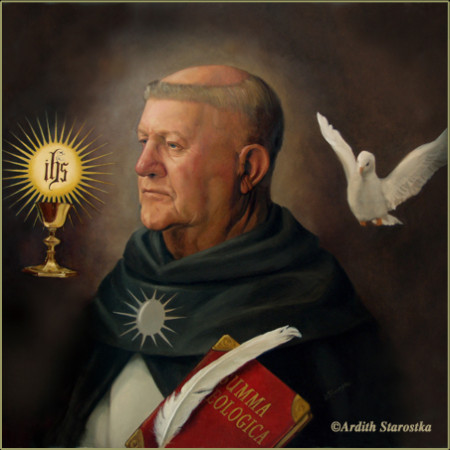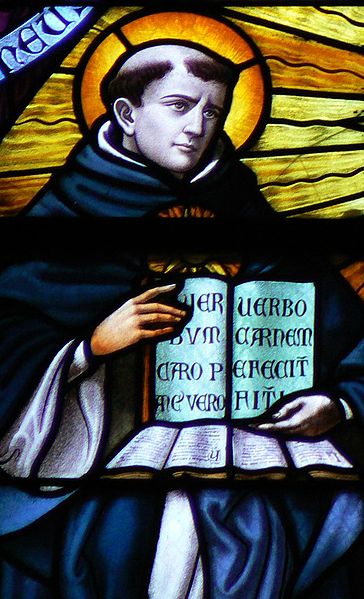Today, the Church celebrates one of Her greatest theologians, Saint Thomas Aquinas. Christopher has some good quotes of his up. The thing that I always find remarkable about St. Thomas Aquinas is that he was one of the most amazing Christians in virtually every field imaginable. There are some Saints who have particularly beautiful writings on Mary, or angels, or the Real Presence in the Eucharist, or the writings of the Church Fathers before them, or who are amazing theologians, or poets, those who give of themselves fully to the needy, and those rare few who communicate directly with God. Aquinas was all of these. He at once wrote some of the most intellectually serious theology ever penned, and easy-to-understand apologetics for the uneducated. And the man was so humble and so slow to parade his own intellect that he was long assumed stupid, earning the nickname “The Dumb Ox” from his peers: even as the young St. Thomas began quietly committing most of the Bible to memory.
As Pope John Paul II has said, in Aquinas, “the demands of reason and the power of faith found the most elevated synthesis ever attained by human thought, for he could defend the radical newness introduced by Revelation without ever demeaning the venture proper to reason.” That is, Aquinas was smart enough to know when his smarts weren’t enough, reasonable enough to know that faith went where even reason could not. To highlight a few of Aquinas’ many gifts, and contributions to the Church he loved:
This is rightfully the most famous section of his most famous work, the Summa Theologica. To over-simplify what he says somewhat, basically:
- The universe, and everything in it, is in motion. It couldn’t have set itself in motion, nor can there be perpetual motion. Someone outside the universe had to set everything into motion. We know this to be God.
- Everything in the universe is caused by something else. But this can’t go on forever. There must be a First Cause. We know this First Cause to be God.
- The universe (and everything in it) is contingent. That is, for the universe and its contents to have existed, certain factors must have been in place. But there can’t be an infinite chain of contingencies: there must be something or Someone Who relies on nothing else to exist, and Who created the conditions giving rise to the universe and its contents. We know this non-contingent Being to be God.
- There are varying degrees of perfection: to say something is better, we suggest it is closer to the perfect Good. This perfect Good is God.
- Everything in Nature is orderly and systematic, including non-intelligent things, like the cosmos. Just as an arrow being shot in a specific direction proves the existence of an intelligent archer, the universe having governing laws (like the laws of physics, e.g.), proves the existence of an intelligent God.
Knox’s summary of Aquinas’ “five ways” (a.k.a. the Quinque Viae) is better than anything I could write, so I’ll leave this one at that.
 In contrast to the formal logic of the Quinque Viae, Aquinas’ loving ode to the Eucharist is much more poetic. Certainly, Aquinas can defend the theology of the Eucharist capably (as he does in Sections 73-83 here, with some of the best parts here), but he’s not just some stuffy theologian. He’s more fully a lover of Christ, a Christian, and he writes as such. :
In contrast to the formal logic of the Quinque Viae, Aquinas’ loving ode to the Eucharist is much more poetic. Certainly, Aquinas can defend the theology of the Eucharist capably (as he does in Sections 73-83 here, with some of the best parts here), but he’s not just some stuffy theologian. He’s more fully a lover of Christ, a Christian, and he writes as such. :
“Word made flesh, by Word He maketh
Very bread his flesh to be;
Man inwine Christ’s Blood partaketh,
And if his senses fail to see,
Faith alone thetrue heart waketh,
To behold the mystery.”
That’s from his hymn Pange Lingua, written for the Feast of Corpus Christi (when the Church announced a new feast day celebrating Christ’s Body and Blood in the Eucharist, Aquinas responded by writing music for the entire Mass). I’ve posted the full hymn here.
As I mentioned earlier this week, Aquinas left us one of the finest compilations of the writings of the early Church Fathers’ Scriptural exegesis. He went through passage by passage of the Gospels, compiling the works of many of the great Saints of the early Church. That source is the Catena Aurea (here’s Matthew, Mark, Luke, and John). That a man of this great a faith, and this sharp an intellect knew that to understand Scripture he should look to what the great Christians before him had said on it is a true testament to his humility, and a guide to all of us.
Aquinas’ work on Mary is profound. He walks through the Angelic Salutation (the first half of the “Hail Mary”) piece by piece. There are a lot of good parts. Aquinas, often called the Angelic Doctor, explained how angels were created superior to sinful man, but inferior to the Blessed Virgin, and that for this reason, sinful men cower in the presence of angels (and when they don’t, the angels pull rank, as Gabriel does to the high priest Zechariah in Luke 1:19), while angels are humbled in Mary’s presence (saluting Her “Hail,” as one salutes royalty — compare the angel’s greeting to Mary in Luke 1:28 and the sarcastic salutation in Mark 15:18, which are identical greetings).
But the best part of the exegesis is the end, in which Aquinas focuses on the phrase “Blessed in the Fruit of Thy Womb,” taken from Luke 1:42. I’ll end it with this as well:
The sinner sometimes seeks in a thing what cannot be attained there, but the just man attains it. Proverbs 13:22: Thus Eve sought in the fruit and did not find there all the things that she desired, but the Blessed Virgin finds in her fruit everything that Eve desired. For Eve desired three things from the fruit. The first what the devil falsely promised her, that they would be as gods, knowing good and evil. You will be, that liar said, like gods, as is read in Genesis 3:5. And he lies because he is a liar, and the father of lies. Eve was not made like God when she ate the fruit, but unlike, because by sinning she receded from God her salvation and was expelled from paradise.
But this is what the Blessed Virgin and all Christians find in the fruit of her womb, because by Christ they are united with and made like unto God. 1 John 3:2: The second thing that Eve desired in the fruit was pleasure, because it is good to eat; but she did not find it and immediately knew that she was naked, and felt sorrow. But in the fruit of the Virgin we find sweetness and salvation. John 6:55: . Third, the fruit of Eve was beautiful in appearance, but more beautiful is the fruit of the Virgin on whom the angels desire to gaze. Psalm 44:3: ; this is because he is the splendor of his Father’s glory.
Eve could not find in her fruit what no sinner can find in his sin. Therefore, what we desire, we should seek in the fruit of the Virgin. Here is a fruit blessed by God, because he has so filled him with every grace that it comes to us by showing him reverence. Ephesians 1:3: By the angels, Apocalypse 7:12: The Apostle, Philippians 2:11: Psalm 117:26:
So therefore is the Virgin blessed, but far more blessed is the fruit of her womb.



That should be Mark 15:18, Joe. “Hail, King of the Jews.”
Otherwise, great post. I’ve never encountered the argument that Gabriel’s “Hail” (chaire) signifies Mary’s royal status, but it’s certainly intriguing. The trouble is that chaire can also mean “rejoice”, which is how many Bibles translate it. How do we know which one is correct.
MGL,
(1) Thanks for catching that. I corrected the reference.
(2) Thanks!
(3) It’s true that the word can mean “Rejoice” or “Hail,” so you have to look at context. Likewise, “Shalom” means “hello,” “goodbye,” and “peace.” We do know that the term is often used in deferential salutations, including in Scripture (Matthew 26:49; Mark 15:18 and parallel verses), that the angel uses it in saluting Mary, that this stands in marked contrast from the way in which that same angel spoke to the high priest Zechariah a few months earlier (Luke 1:19-20), and that the reason Gabriel pulled rank on Zechariah is a reason to be humble before Mary.
I wrote a post addressing the question you raised (http://catholicdefense.blogspot.com/2011/01/zechariah-gabriel-and-mary.html), only to discover I’d already written one on the exact same subject a year and a half ago (http://catholicdefense.blogspot.com/2009/05/mary-fully-graced-angelic-salutation.html).
Joe